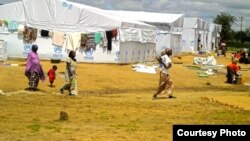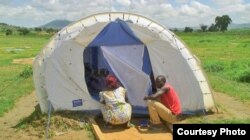MAROUA, CAMEROON —
Thousands of people have fled northeastern Nigeria since mid-May when the Nigerian military began an offensive against the militant Islamist sect, Boko Haram. Neighboring countries like Cameroon have been confronted with a double challenge as they try to meet the needs of civilians fleeing violence, while also trying to prevent infiltration by Boko Haram militants.
Pastor Daouda Dilmas is one of thousands of Nigerians who have fled into northern Cameroon in the past four months.
He fled with his family from the Goza local government area of Borno State in early June. "We came here because of the Boko Haram attacks on us,” he said, adding that they had been calling on Nigerian authorities for help, but the intervention came too late.
"Because we had been reporting to them but they were unable to come as early as possible. That is the reason that we run for our lives," said Dilmas.
The pastor and his family are living at a refugee camp set up by the U.N. and Cameroon's government in Minawao, about 130 kilometers east of the border. However, most of the refugees are squatting in communities or staying in makeshift shelters in the bush.
It is difficult to know exactly how many people have arrived. U.N. agencies have counted between 3,000 and 8,000 refugees. Local government and civil society sources say that number is closer to 20,000 and that it is mostly women and children.
The Boko Haram insurgency has been raging in northern Nigeria since 2010. Thousands have been killed. The militant sect wants to establish an Islamic state in northern Nigeria. The state launched a large-scale military offensive against Boko Haram in mid-May.
Security forces have restricted media access to the frontlines, and cell phone communications have been cut in much of the northeast during the offensive.
Living in fear
A VOA reporter visited refugees scattered throughout northern Cameroon in August. The refugees described having fled in great haste, leaving behind belongings and herds of cattle. Some said they decided to leave following threats and brutal attacks by Boko Haram militants. Some described waking up in the middle of the night to gunshots as soldiers battled militants. They said they fled soon after for fear of being caught in the crossfire. Many said that they feared the Nigerian military.
Shenaku Alimu said she fled her village of Hadwa after soldiers killed her husband.
She recounted how one evening in June, soldiers raided her village.
“They said they had come to arrest Boko Haram militants. My husband, who is Muslim, got scared and tried to run. They shot and killed him in front of me… The authorities have failed to protect us and that is why I fled Nigeria. I am not keen to go back. I lost everything, including my husband," said Alimu.
Human rights organizations say that the Nigerian military's heavy-handed response to Boko Haram over the past three years has included abuses against civilians that have only fed the insurgency.
The Nigerian government denies such accusations.
There is concern that ongoing military action in Nigeria will push militants into Cameroon and Niger.
Cameroon has been on guard against possible spillover from the insurgency. Boko Haram claimed responsibility for kidnapping a French family of seven in northern Cameroon in February. The family was released two months later following negotiations.
In August, the Nigerian military released a statement saying that Boko Haram leader, Abubakar Shekau, had been injured in battle and then snuck across the border into the Cameroonian town of Amitchide where he later died.
In June, Cameroon deployed part of its elite Rapid Intervention Battalion to reinforce security along its border with Nigeria.
Entry denied
Some refugees told VOA that Cameroonian security forces initially blocked them from crossing the border out of fear that they were Boko Haram.
Amadou Mbaino said he was not able to get into Cameroon until July. He is now living in a community school building in Mokolo town but remains one of the thousands of undocumented refugees in the country.
He said "when we were fleeing, security forces stopped us at the border and ordered us to go back. They said we could be Boko Haram militants and so we had to trek for several days to find crossings where there were no soldiers. As I speak, I am not at ease because there are frequent controls by gendarmes who want to send us back. But I cannot go back to hell."
The governor of the Far North region, which has the highest concentration of refugees, told VOA that refugees must start complying with immigration regulations or face the consequences.
Cameroonian border communities, like the village of Sangme, say it is a question of security.
Village chief Moussa Abdoulaye said "that is the problem. We do not know who is who among these people. Their presence here is causing us worries because we don't know if there are any Boko Haram members among them or whether Boko Haram would follow them to attack them here. We are taking measures to send back anyone with suspicious behavior."
Humanitarian agencies have been working to provide assistance to refugees, in particular in the Minawao refugee camp. However, there are concerns that the massive influx is straining the already limited resources of host communities. northern Cameroon is prone to food shortages and disease outbreaks during the rainy season.
Pastor Daouda Dilmas is one of thousands of Nigerians who have fled into northern Cameroon in the past four months.
He fled with his family from the Goza local government area of Borno State in early June. "We came here because of the Boko Haram attacks on us,” he said, adding that they had been calling on Nigerian authorities for help, but the intervention came too late.
"Because we had been reporting to them but they were unable to come as early as possible. That is the reason that we run for our lives," said Dilmas.
The pastor and his family are living at a refugee camp set up by the U.N. and Cameroon's government in Minawao, about 130 kilometers east of the border. However, most of the refugees are squatting in communities or staying in makeshift shelters in the bush.
It is difficult to know exactly how many people have arrived. U.N. agencies have counted between 3,000 and 8,000 refugees. Local government and civil society sources say that number is closer to 20,000 and that it is mostly women and children.
The Boko Haram insurgency has been raging in northern Nigeria since 2010. Thousands have been killed. The militant sect wants to establish an Islamic state in northern Nigeria. The state launched a large-scale military offensive against Boko Haram in mid-May.
Security forces have restricted media access to the frontlines, and cell phone communications have been cut in much of the northeast during the offensive.
Living in fear
A VOA reporter visited refugees scattered throughout northern Cameroon in August. The refugees described having fled in great haste, leaving behind belongings and herds of cattle. Some said they decided to leave following threats and brutal attacks by Boko Haram militants. Some described waking up in the middle of the night to gunshots as soldiers battled militants. They said they fled soon after for fear of being caught in the crossfire. Many said that they feared the Nigerian military.
Shenaku Alimu said she fled her village of Hadwa after soldiers killed her husband.
She recounted how one evening in June, soldiers raided her village.
“They said they had come to arrest Boko Haram militants. My husband, who is Muslim, got scared and tried to run. They shot and killed him in front of me… The authorities have failed to protect us and that is why I fled Nigeria. I am not keen to go back. I lost everything, including my husband," said Alimu.
Human rights organizations say that the Nigerian military's heavy-handed response to Boko Haram over the past three years has included abuses against civilians that have only fed the insurgency.
The Nigerian government denies such accusations.
There is concern that ongoing military action in Nigeria will push militants into Cameroon and Niger.
Cameroon has been on guard against possible spillover from the insurgency. Boko Haram claimed responsibility for kidnapping a French family of seven in northern Cameroon in February. The family was released two months later following negotiations.
In August, the Nigerian military released a statement saying that Boko Haram leader, Abubakar Shekau, had been injured in battle and then snuck across the border into the Cameroonian town of Amitchide where he later died.
In June, Cameroon deployed part of its elite Rapid Intervention Battalion to reinforce security along its border with Nigeria.
Entry denied
Some refugees told VOA that Cameroonian security forces initially blocked them from crossing the border out of fear that they were Boko Haram.
Amadou Mbaino said he was not able to get into Cameroon until July. He is now living in a community school building in Mokolo town but remains one of the thousands of undocumented refugees in the country.
He said "when we were fleeing, security forces stopped us at the border and ordered us to go back. They said we could be Boko Haram militants and so we had to trek for several days to find crossings where there were no soldiers. As I speak, I am not at ease because there are frequent controls by gendarmes who want to send us back. But I cannot go back to hell."
The governor of the Far North region, which has the highest concentration of refugees, told VOA that refugees must start complying with immigration regulations or face the consequences.
Cameroonian border communities, like the village of Sangme, say it is a question of security.
Village chief Moussa Abdoulaye said "that is the problem. We do not know who is who among these people. Their presence here is causing us worries because we don't know if there are any Boko Haram members among them or whether Boko Haram would follow them to attack them here. We are taking measures to send back anyone with suspicious behavior."
Humanitarian agencies have been working to provide assistance to refugees, in particular in the Minawao refugee camp. However, there are concerns that the massive influx is straining the already limited resources of host communities. northern Cameroon is prone to food shortages and disease outbreaks during the rainy season.





